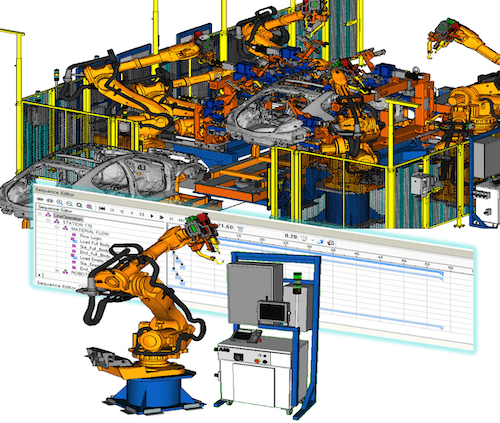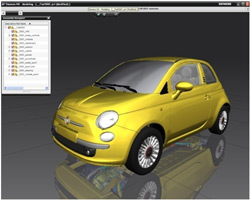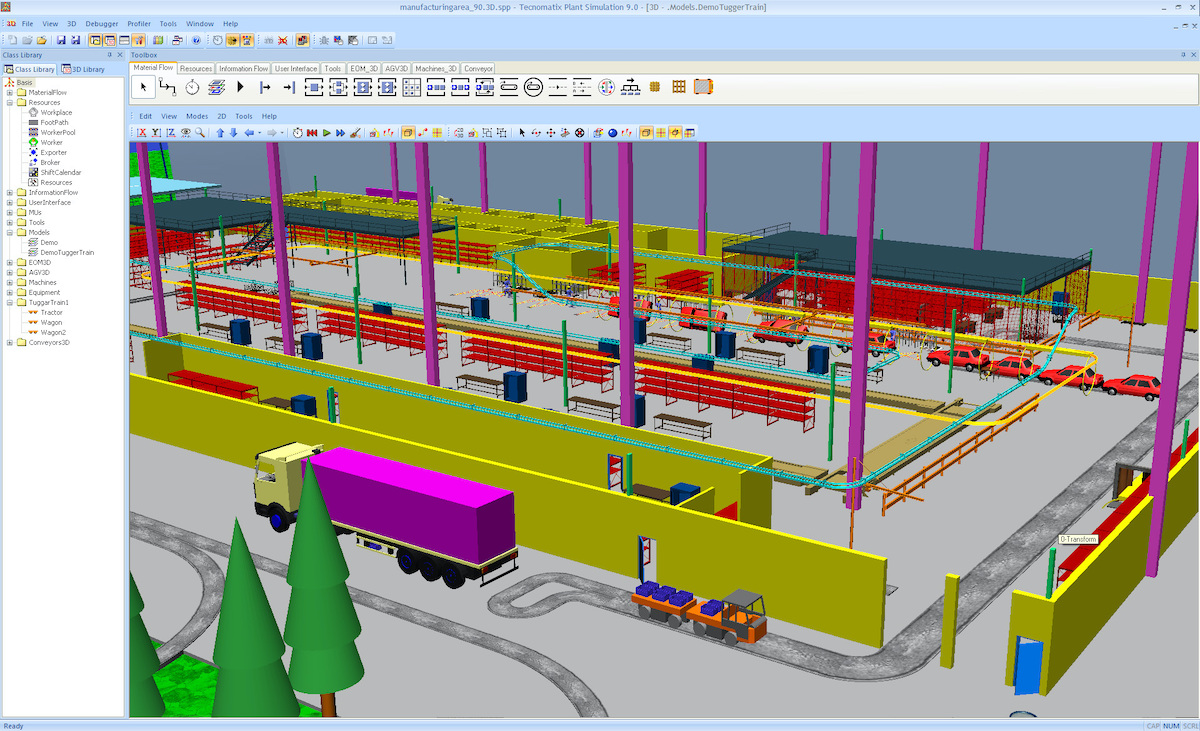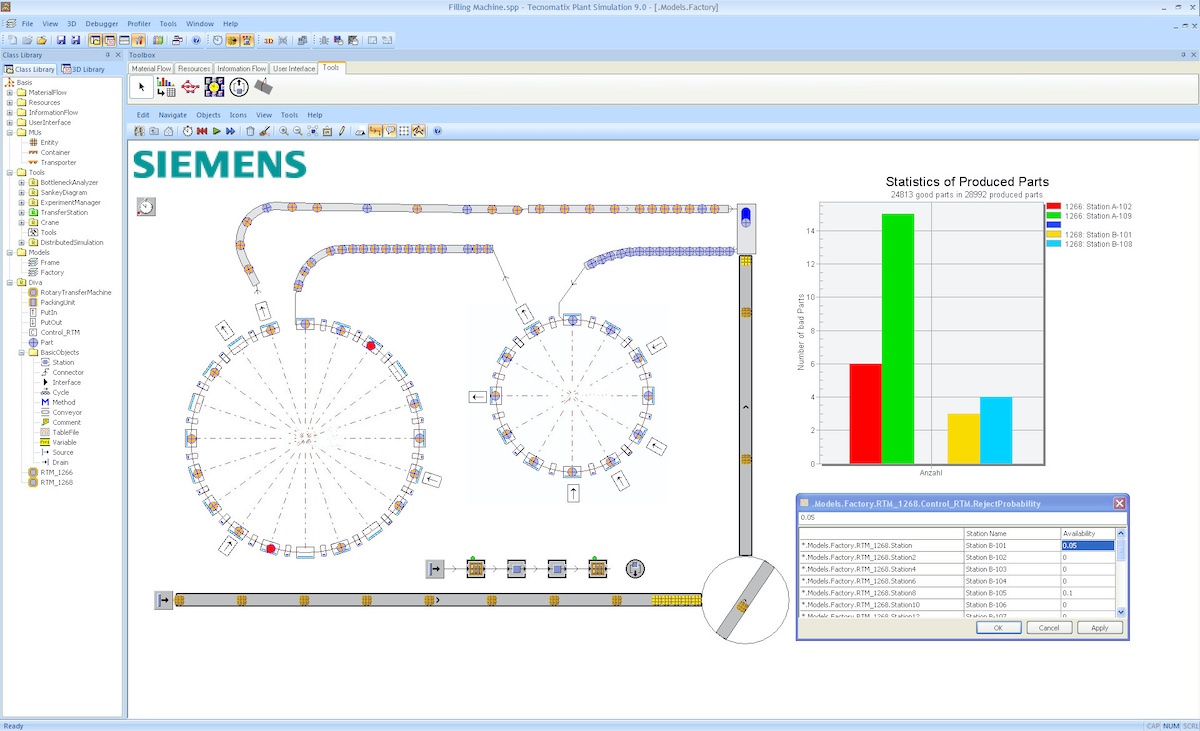
Siemens Process Simulate Builds Efficient Assembly Lines
December 28, 2021
What is NX?
March 1, 2022Plant simulation in manufacturing allows companies to simulate, visualize, and analyze production and logistic processes. Tecnomatix plant simulation software aims to optimize all aspects of production systems, including resource optimization and material flow.
As production companies face increasing costs and time constraints, logistics optimization ensures long-term sustainability and profitability. By formulating real-world decision criteria for the evaluation and comparison of alternative production approaches, companies can:
- Improve delivery times
- Implement lean production principles into production lines
- Design and build production facilities that are sustainable over the long run
- Manage global manufacturing infrastructure and networks
- Optimize material flow resource

Tecnomatix Plant Simulation
Using plant simulation, companies can create digital twins of logistics systems. Then, users can use these digital twins to run experiments and gain insights into system characteristics without disrupting any existing systems.
By generating these digital models, local plants can optimize system characteristics before installation, minimizing production line investment costs while eliminating potential issues. Logistics system designers can also run these simulations to optimize existing systems’ energy efficiency and performance.
What Industries Use Plant Simulation?
Various industries implement plant simulations to simulate material flow and ensure sustainable industrial production and logistics processes. These industries include:
- Automotive manufacturing and automotive supply industries
- Aerospace sectors, including missiles, military aircraft, spacecraft, general aviation, and commercial airliners
- Plants for manufacturing industries, such as clothing, electrical equipment, and pharmaceuticals
- Mechanical engineering industries, including construction, metals, and materials
- Process industries where primary production is continuous or takes place on indistinguishable materials batches
- Consumer packaged goods industries
- Airports, harbors, container terminals, and shipyards
- Logistics industries, including transport, storage, and production
- Warehouse supply industries
- Automated guided vehicle system industry
Plant simulation software has a wide application range and allows companies across various industries to simulate a global manufacturing network, a manufacturing plant, or just one assembly line. Plant simulation is suitable for all levels of plant planning and helps users minimize production line costs while meeting output requirements.
What Are the Benefits of Using Plant Simulation Software?
How can plant simulation software benefit your company? Using plant simulation software, you can create a digital twin of your facility and each of its components, including machinery, manual workstations, conveyors, and storage points.
After creating a digital twin of your production process, you can use this simulation to learn more about its characteristics and output while identifying potential issues and suboptimality. Using a plant simulation tool, you can generate reports on every aspect and component of your production process, including:
- Output changes
- Uptime versus downtime
- Throughput
- Human resource utilization
Planning for physical production changes from global production facilities can be time-intensive and expensive. This process often involves shutting down the production line before disassembling, relocating, and reassembling machines.
However, when using plant simulation software, management can simulate the changes and calculate output and cost changes without disrupting the physical line. For example, if plant management considers implementing a new machine, they can virtually insert the machine into the line, then determine if the change has cost or production benefits.
What Is Siemens Tecnomatix Plant Simulation?
Siemens Process Simulate falls under the Tecnomatix groups of Assembly Planning and Validation and Robotics and Automation Planning. On the other hand, Siemens Plant Simulation falls under Design and Optimization, along with Factory Flow and Factory CAD.
Maximizes Manufacturing Performance
Tecnomatix Plant Simulation is a Siemens Digital Industries Software that allows you to render digital models or “digital twins” of manufacturing line systems to gain insights into their characteristics and determine the necessary steps to maximize their performance.
Creating digital models allows for the analysis of logistics, resource allocation, and material on all levels of the production process. Assembly teams can carry out a production simulation and conduct what-if analyses without shutting down existing production systems.
You can also use Plant Simulation during the planning phase before installing the existing production systems.
Optimizes Production System Analysis
Your organization can optimize manufacturing logistics, material handling, machine allocation, and manual labor with discrete event simulation and statistical analysis functions. This software also offers object-oriented stochastic tools and 3D modeling to enhance manufacturing efficiency and accuracy, along with general system performance and throughput.
Plant Simulation offers real-time information in the form of graphs, charts, reports, and genetic algorithms. You can also access experimentation tools to gauge production system behavior and make quick and informed decisions.
Streamlines Throughput
Plant Simulation offers a wide range of tools for streamlining throughput, including visual bottleneck detection, throughput analysis, Gantt charts, Sankey diagrams, and more. Using this tool, you can view machine utilization, output per unit, and other parameters at a glance, which allows for quick issue identification and process streamlining.
The digital models take all external and internal supply chains into account, along with your unique business processes and production resources, allowing for accurate and real-world analyses.
Provides In-Depth Energy Analysis
Tecnomatix Plant Simulation features an integrated and graphic energy analyzer that indicates the production system’s current, total, and maximum energy consumption levels. This feature includes an energy plotter, which dynamically indicates energy consumption throughout the simulation.
The energy plotter shows energy consumption during operation and scheduled breaks. Because this feature shows energy usage graphically, identifying opportunities for energy savings is easy.
Has Virtual Commission Capabilities
Plant management teams can link Tecnomatix Plant Simulation to real-world plant control, simulating an actual production process. This function allows for the testing and optimizing of the production system’s control, material pathways, automation, and engineering operation.
Teams can either connect a hardware programmable logic controller (PLC) or a software PLC from the real-world environment to analyze its performance. Plant Simulation’s commissioning solution is highly flexible and compatible with any programmable logic controller.
Contact 4D Systems
At 4D Systems, we are a leading provider of Siemens PLM software, including Siemens Tecnomatix solutions. Our engineering team has extensive experience in product lifecycle management solutions, including design, engineering, and manufacturing.
Our objective is to provide you with a competitive edge in the market by outputting high-quality products faster while saving valuable time and money.
Do you want to implement a comprehensive digital product development solution into your operations? Our team at 4D Systems will provide you with a custom Siemens Tecnomatix solution that fits all your project requirements. Please contact us today at (800) 380-9165 or by email at [email protected].


